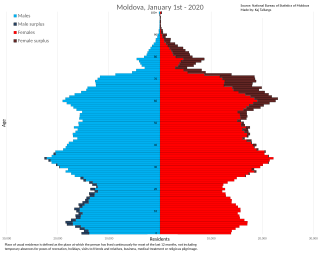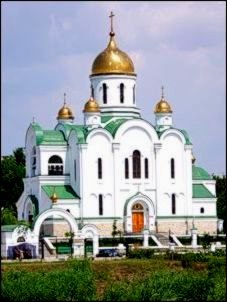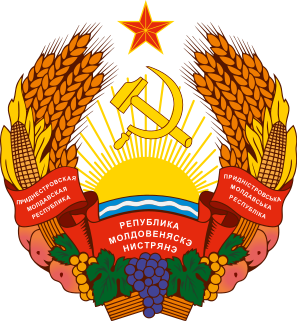Related Research Articles

This article is about the demographic features of the population of Moldova, including distribution, ethnicity, languages, religious affiliation and other statistical data.

Tiraspol is the capital of Transnistria, a breakaway state in Moldova, where it is the second largest city. The city is located on the eastern bank of the Dniester River. Tiraspol is a regional hub of light industry, such as furniture and electrical goods production.

Transnistria, officially the Pridnestrovian Moldavian Republic (PMR), is an unrecognised breakaway state internationally recognised as part of Moldova. Transnistria is mostly located in most of the narrow strip of land between the Dniester river and the Moldovan–Ukrainian border, although it also controls land at the river's other bank. Its capital and largest city is Tiraspol. Transnistria has been recognised by only three other unrecognised or partially recognised breakaway states: Abkhazia, Artsakh, and South Ossetia. Transnistria is officially designated by the Republic of Moldova as the Administrative-Territorial Units of the Left Bank of the Dniester or as Stînga Nistrului under Russian military occupation.

The ruble is the currency of Transnistria and is divided into 100 kopecks. Since Transnistria is a state with limited international recognition and considered as part of Moldova, its currency has no ISO 4217 code. However, unofficially some Transnistrian organisations, such as Agroprombank and Gazprombank, used the code PRB, a code that would otherwise be reserved for Puerto Rico. The Transnistrian Republican Bank sometimes uses the code RUP.
Transnistria is a region in Eastern Europe that is under the effective control of the self-declared Pridnestrovian Moldavian Republic but is recognized by the international community as an administrative unit of Moldova, the Administrative-Territorial Units of the Left Bank of the Dniester. The Pridnestrovian Moldavian Republic uses a coat of arms based on the arms of the former Moldavian Soviet Socialist Republic and the Administrative-Territorial Units of the Left Bank of the Dniester use the coat of arms of Moldova.

The Transnistria War was an armed conflict that broke out on 2 November 1990 in Dubăsari between pro-Transnistria (PMR) forces, including the Transnistrian Republican Guard, militia and neo-Cossack units, and pro-Moldovan forces, including Moldovan troops and police.

The Transnistria conflict is an ongoing frozen conflict between Moldova and the unrecognized state of Transnistria. Its most active phase was the Transnistria War, which ended in a Russian-backed Transnistrian victory. There have been several attempts to resolve the conflict, although none have been successful. The conflict may be considered as having started on 2 September 1990, when Transnistria made a sovereignty declaration from Moldova.

This is the history of Transnistria. See also the history of Europe.

The Transnistrian Republican Bank is the central bank of Transnistria. It issues its own currency, the Transnistrian ruble and also a series of memorial gold and silver coins, among them The Outstanding People of Pridnestrovie.

The Nativity Church, also known as the Cathedral of the Birth of Christ, is the largest and newest church in Tiraspol, the capital of Transnistria. It is a Russian Orthodox Church completed in 1999 to serve as the Mother Church of the Orthodox Christian Diocese of Tiraspol.
This is a survey of the postage stamps and postal history of Transnistria, an unrecognized breakaway territory of Moldova and the de facto independent Pridnestrovian Moldavian Republic.

The Romanian-language schools in Transnistria are subject to limitations by the government of Transnistria, an unrecognized breakaway region of Moldova since 1992.
Oxana Ionova was the head of the state tax service of Transnistria and director of Transnistria's central bank from 2008 to 2011. She was born in Tiraspol on 3 June 1966. She started her work in the Ministry of Interior of Transnistria in 1994 as accountant. In 1997 she was appointed head of financial and economic department of the State Customs Committee of Transnistria. In 2000 President Igor Smirnov appointed Ionova as the new Minister of Revenues of Transnistria. After the reform of fiscal service and abolition of the separate ministry of revenues Ionova was appointed head of state tax service of Transnistria. In 2008 President Smirnov proposed Ionova's candidature to the Supreme Council to be appointed as director of Transnistrian Republican Bank.

Vadul Turcului is a commune in Transnistria, Moldova. Its name means "Turk's ford" in Romanian. It is composed of two villages, Molochișul Mic and Vadul Turcului.

The state of affairs with human rights in Transnistria has been criticized by several governments and international organizations. The Republic of Moldova, and other states and non-governmental organizations (NGOs) claim that the government of Transnistria is authoritarian and has a record of arbitrary arrest and torture.
The mass media of Transnistria, the breakaway territory within the borders of Moldova, features both state-owned or supported outlets and opposition media. Publications are in Russian, with a single newspaper in each of the other two official languages, Moldovan (Romanian), and Ukrainian.

The Pridnestrovian Moldavian Soviet Socialist Republic (PMSSR), also commonly known as Soviet Transnistria or simply known as Transnistria, was created on the eastern periphery of the Moldavian Soviet Socialist Republic (MSSR) in 1990 by pro-Soviet separatists who hoped to remain within the Soviet Union when it became clear that the MSSR would achieve independence from the USSR and possibly unite with Romania. The PMSSR was never recognised as a Soviet republic by the authorities in either Moscow or Chișinău. In 1991, the Pridnestrovian Moldavian Republic succeeded the Pridnestrovian Moldavian Soviet Socialist Republic.

This timeline of events is a chronological list of incidents and other notable occurrences related to the War of Transnistria, including events leading up to the war.
The Constitution provides for freedom of religion, and the Government generally respects this right in practice; however, the 1992 Law on Religions, which codifies religious freedoms, contains restrictions that inhibit the activities of unregistered religious groups. Although the law was amended in 2002, many of the restrictions remain in place. The law provides for freedom of religious practice, including each person's right to profess his or her religion in any form. It also protects the confidentiality of the confessional, allows denominations to establish associations and foundations, and states that the Government may not interfere in the religious activities of denominations. The law specifies that "in order to organize and function", religious organizations must be registered with the Government, and unregistered groups may not own property, engage employees, or obtain space in public cemeteries in their own names.
Cathedral of the Nativity, and its variants, can refer to: